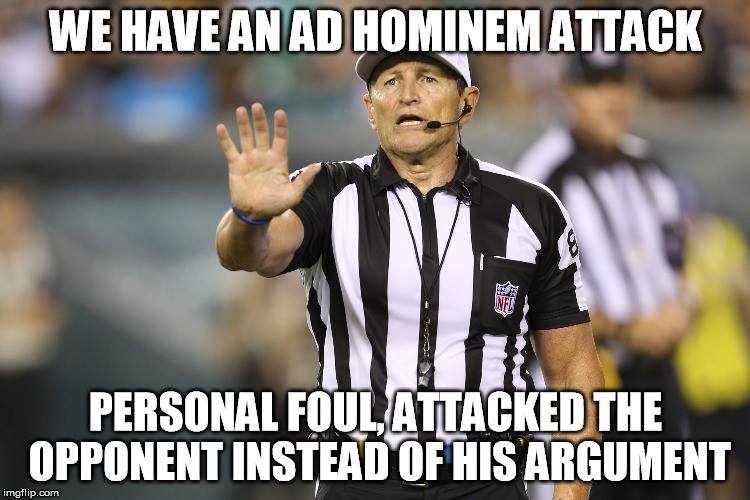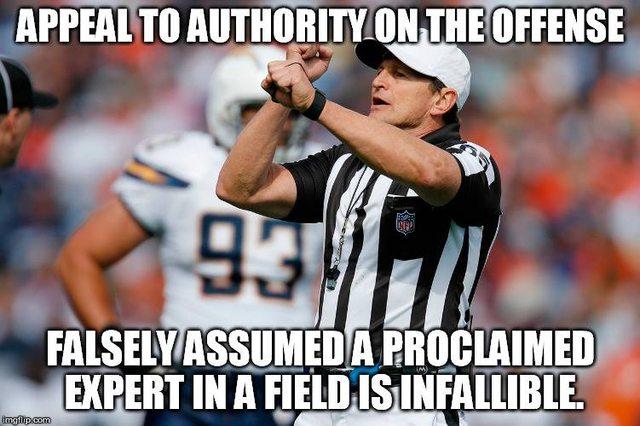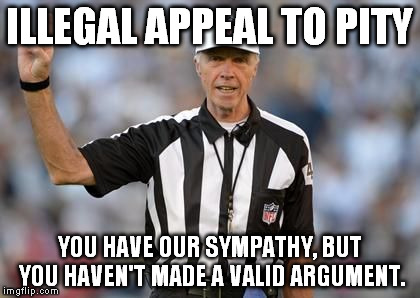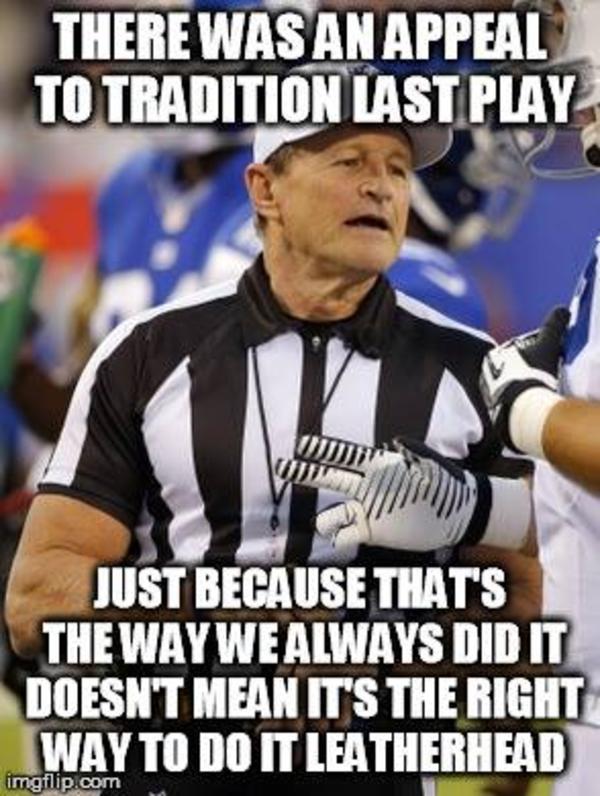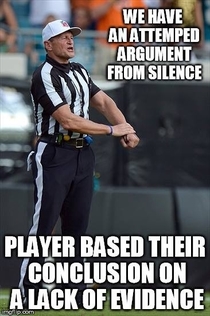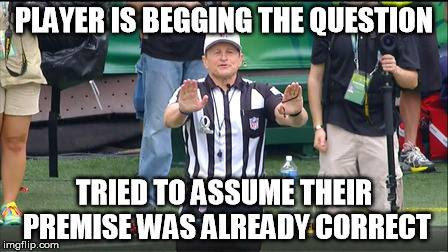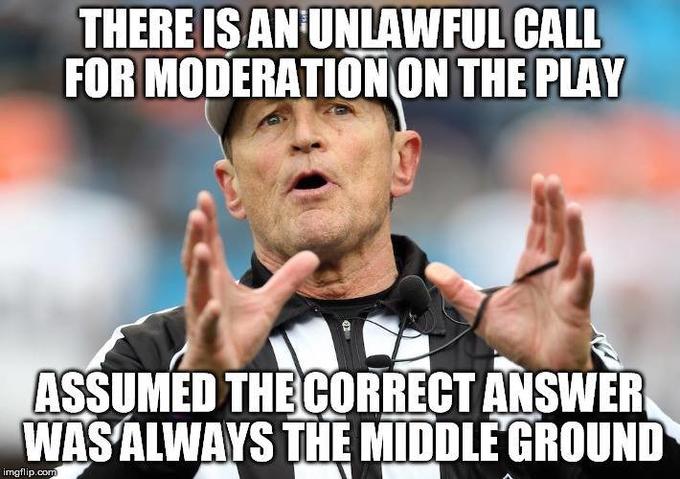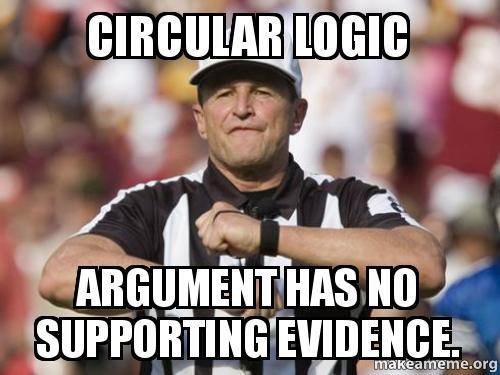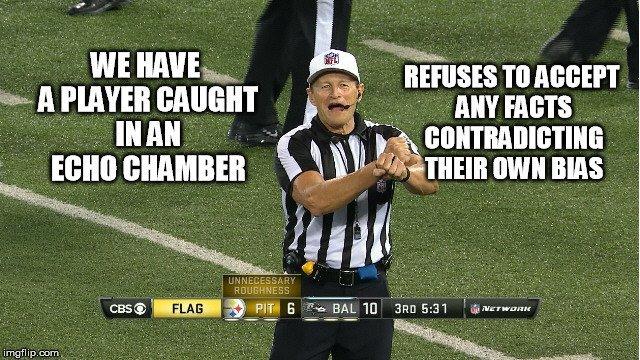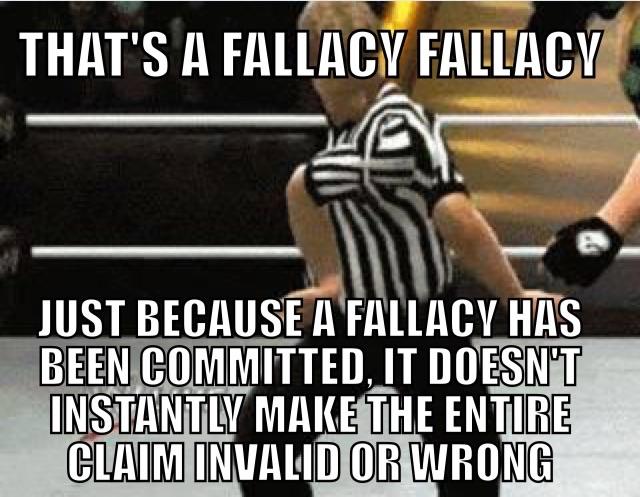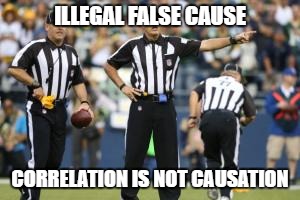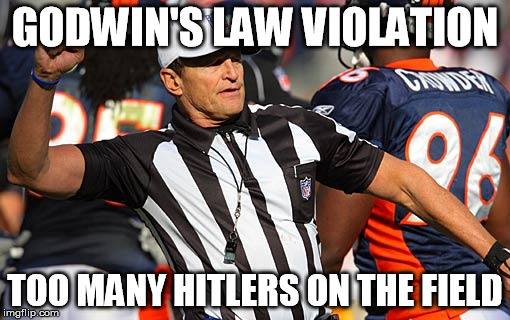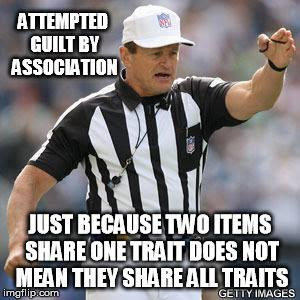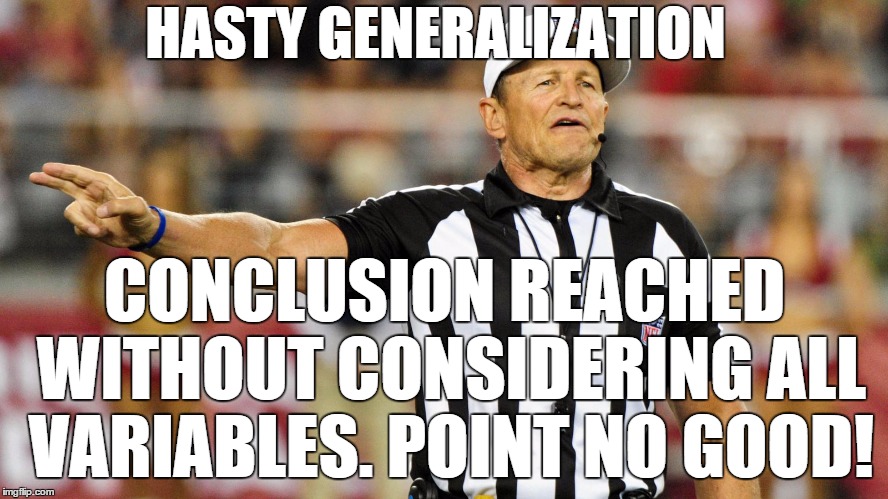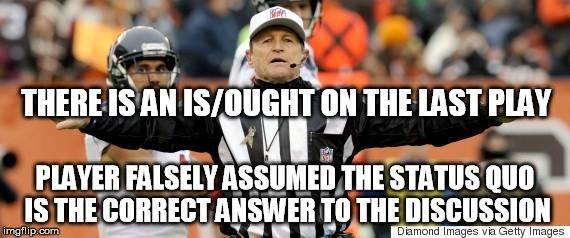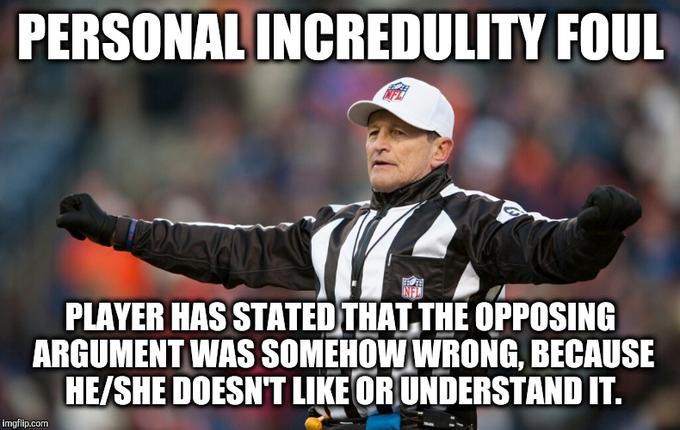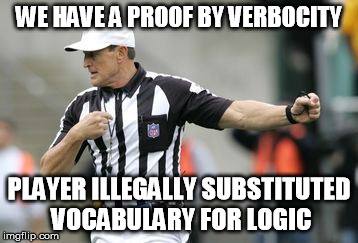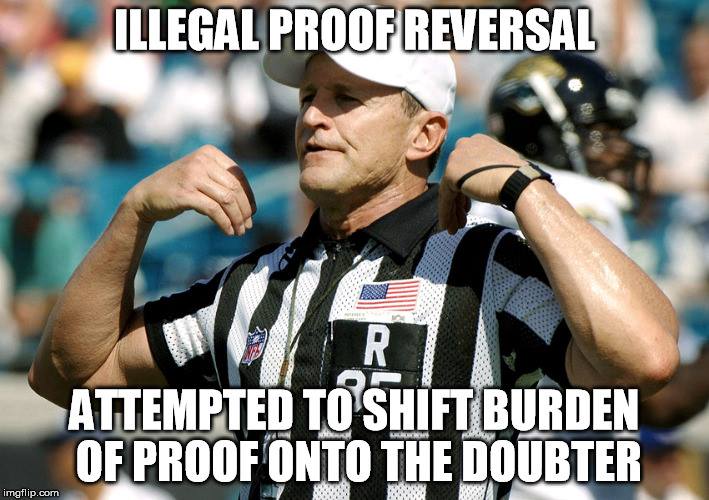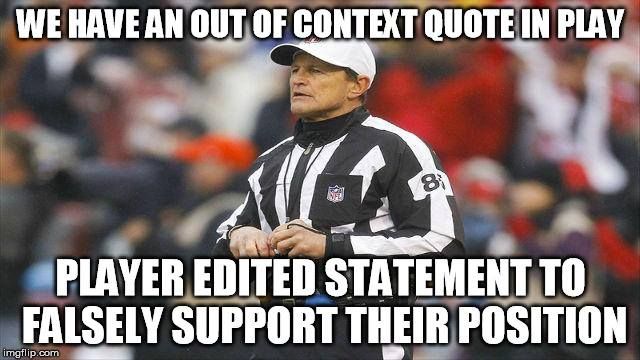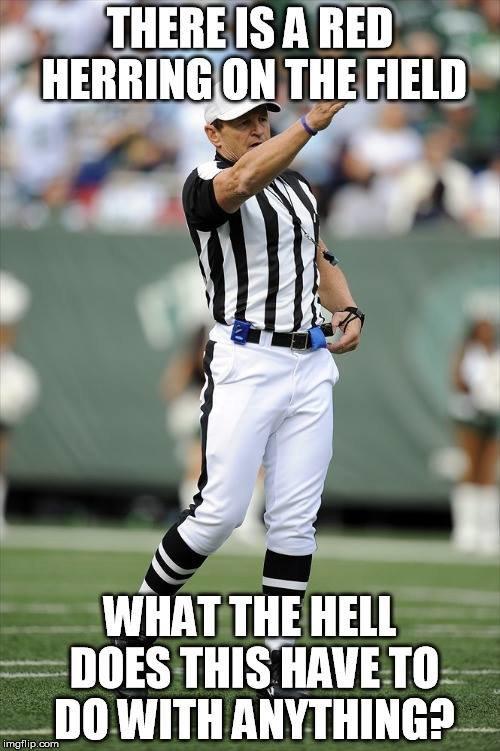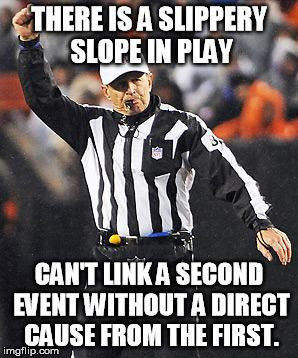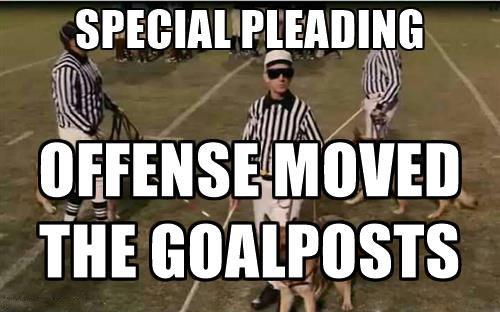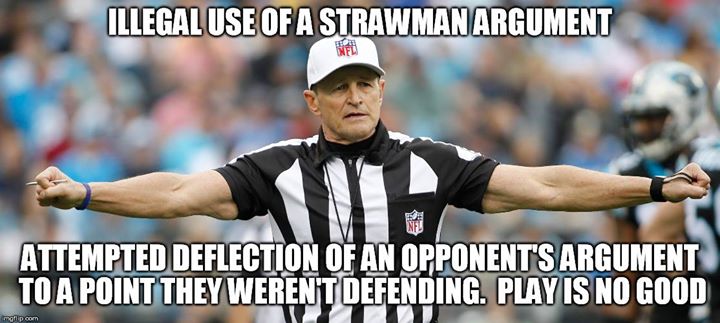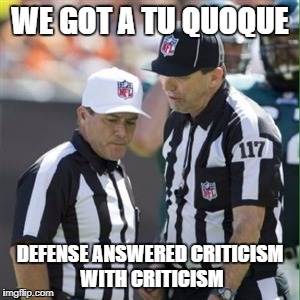NFL Refs Explain Logical Fallacies
You attacked your opponent's character or personal traits in an attempt to undermine their argument.
Ad hominem attacks can take the form of overtly attacking somebody, or more subtly casting doubt on their character or personal attributes as a way to discredit their argument. The result of an ad hom attack can be to undermine someone's case without actually having to engage with it.
Example: After Sally presents an eloquent and compelling case for a more equitable taxation system, Sam asks the audience whether we should believe anything from a woman who isn't married, was once arrested, and smells a bit weird.
You said that because an authority thinks something, it must therefore be true.
It's important to note that this fallacy should not be used to dismiss the claims of experts, or scientific consensus. Appeals to authority are not valid arguments, but nor is it reasonable to disregard the claims of experts who have a demonstrated depth of knowledge unless one has a similar level of understanding and/or access to empirical evidence. However it is, entirely possible that the opinion of a person or institution of authority is wrong; therefore the authority that such a person or institution holds does not have any intrinsic bearing upon whether their claims are true or not.
Example: Not able to defend his position that evolution 'isn't true' Bob says that he knows a scientist who also questions evolution (and presumably isn't a primate).
You attempted to manipulate an emotional response in place of a valid or compelling argument.
Appeals to emotion include appeals to fear, envy, hatred, pity, pride, and more. It's important to note that sometimes a logically coherent argument may inspire emotion or have an emotional aspect, but the problem and fallacy occurs when emotion is used instead of a logical argument, or to obscure the fact that no compelling rational reason exists for one's position. Everyone, bar sociopaths, is affected by emotion, and so appeals to emotion are a very common and effective argument tactic, but they're ultimately flawed, dishonest, and tend to make one's opponents justifiably emotional.
Example: Luke didn't want to eat his sheep's brains with chopped liver and brussel sprouts, but his father told him to think about the poor, starving children in a third world country who weren't fortunate enough to have any food at all.
You claimed that something has always been done a certain way, and therefore that way was the correct way.
Just as it takes people to start traditions, it takes people to end them. A tradition is not a reason for action — it is like watching the same movie over and over again but never asking why you should keep watching it.
Example: Susan said that marriage has traditionally been between a man and a woman; therefore, gay marriage should not be allowed. Stan pointed out that marriage traditionally reinforced alliances between rival fiefdoms, so he was wondering what fiefdom Susan would be representing when she got married.
You knew that if a particular piece of evidence existed, it would prove a certain point. But since that piece of evidence doesn’t exist, you reason, that point must be false.
This is an informal fallacy that occurs when someone interprets someone's or something's silence as anything other than silence, typically claiming that the silence was in fact communicating agreement or disagreement. The fallacy is an argument from ignorance. The reason this technique works so well is because imagined reasons are often more persuasive than real reasons. If someone wants to be convinced, this technique works like a charm. However, silence is not a valid substitute for reason or evidence.
John and Joe are discussing sexual assaults on campus. Joe grows tired of arguing, and John argues that Joe's silence "allowed" for any number of things on which Joe remained silent. Conversely, Joe may not argue that his act of remaining silent "disallowed" any number of things on which he were being silent.
You presented a circular argument in which the conclusion was included in the premise.
This logically incoherent argument often arises in situations where people have an assumption that is very ingrained, and therefore taken in their minds as a given. Circular reasoning is bad mostly because it's not very good.
Example: The word of Zorbo the Great is flawless and perfect. We know this because it says so in The Great and Infallible Book of Zorbo's Best and Most Truest Things that are Definitely True and Should Not Ever Be Questioned.
You claimed that a compromise, or middle point, between two extremes must be the truth.
Much of the time the truth does indeed lie between two extreme points, but this can bias our thinking: sometimes a thing is simply untrue and a compromise of it is also untrue. Half way between truth and a lie, is still a lie.
Example: Holly said that vaccinations caused autism in children, but her scientifically well-read friend Caleb said that this claim had been debunked and proven false. Their friend Alice offered a compromise that vaccinations must cause some autism, just not all autism.
You claimed that your argument was true, then supported that assertion by attempting to prove its truth from the argument itself.
This fallacy is also known as “Circulus in Probando.” This error is committed when an argument takes its evidence from an element inside the argument itself instead of from an outside one
Example: Jimmy believes Frosted Flakes are great, because it says so on the Frosted Flakes box.
You can't see another point of view because you've insulated yourself against any point of view that disagrees with yours.
An echo chamber, also known as an ideological echo chamber, or the more longwinded closed ideology echo chamber, is a group situation where information, ideas, and beliefs are uncritically bounced from insider to insider and amplified, while dissenting views are censored and/or ignored. Other common features of echo chamber environments include the identification of the enemy and their beliefs (and thus discrediting anything that came from them), cultural tribalism, the targeting of hate figures, and the punishment of heretical thoughts and actions.
Example: Gerald and Donald are discussing overseas sweatshops and child labor. All of Donald's friends on social media think that keeping the cost of their tennis shoes low is more important than worying about the lives of people hundreds of miles away, so Donald can't understand Gerald's position.
You presumed that because a claim has been poorly argued, or a fallacy has been made, that the claim itself must be wrong.
It is entirely possible to make a claim that is false yet argue with logical coherency for that claim, just as it is possible to make a claim that is true and justify it with various fallacies and poor arguments.
Example: Recognising that Amanda had committed a fallacy in arguing that we should eat healthy food because a nutritionist said it was popular, Alyse said we should therefore eat bacon double cheeseburgers every day.
You presumed that a real or perceived relationship between two things means that one is the cause of the other.
Many people confuse correlation (things happening together or in sequence) for causation (that one thing actually causes the other to happen). Sometimes correlation is coincidental, or it may be attributable to a common cause.
Example: Pointing to a fancy chart, Roger shows how temperatures have been rising over the past few centuries, while at the same time the numbers of pirates have been decreasing; thus pirates cool the world and global warming is a hoax.
You presented two alternative states as the only possibilities, when in fact more possibilities exist.
Also known as the false dilemma, this insidious tactic has the appearance of forming a logical argument, but under closer scrutiny it becomes evident that there are more possibilities than the either/or choice that is presented. Binary, black-or-white thinking doesn't allow for the many different variables, conditions, and contexts in which there would exist more than just the two possibilities put forth. It frames the argument misleadingly and obscures rational, honest debate.
Example: While rallying support for his plan to fundamentally undermine citizens' rights, the Supreme Leader told the people they were either on his side, or they were on the side of the enemy.
You responded to your questioner with an attack that stretched the bounds of credulity by making hyperbolic comparisons.
Godwin's law (or Godwin's rule of Hitler analogies) is an adage which asserts that "As an online discussion grows longer, the probability of a comparison involving Hitler approaches 1" — that is, if an online discussion (regardless of topic or scope) goes on long enough, sooner or later someone will compare someone or something to Hitler or his deeds.
Example: While filling out an online petition in support of PETA, Darrell claimed that anyone who ate meat was actually worse than Hitler.
You applied the characteristics of one person or group to another person or group, without any warrant to do so or proof of a connection.
This fallacy asserts, by irrelevant association and often by appeal to emotion, that qualities of one thing are inherently qualities of another. Guilt by association can sometimes also be a type of ad hominem fallacy, if the argument attacks a person because of the similarity between the views of someone making an argument and other proponents of the argument.
Example: Twyla was running for mayor. In one of her speeches she noted, "My opponent for office just received an endorsement from the Puppy Haters Association. Is that the sort of person you would want to vote for?"
You used a personal experience or an isolated example instead of a sound argument or compelling evidence.
It's often much easier for people to believe someone's testimony as opposed to understanding complex data and variation across a continuum. Quantitative scientific measures are almost always more accurate than personal perceptions and experiences, but our inclination is to believe that which is tangible to us, and/or the word of someone we trust over a more "abstract" statistical reality. This fallacy draws a conclusion based on a small sample size, rather than looking at statistics that are much more in line with the typical or average situation. It is also known as: argument from small numbers, statistics of small numbers, insufficient statistics, argument by generalization, faulty generalization, hasty induction, inductive generalization, insufficient sample, lonely fact fallacy, over generality, overgeneralization, or an unrepresentative sample.
Example: Jason said that that was all cool and everything, but his grandfather smoked, like, 30 cigarettes a day and lived until 97 - so don't believe everything you read about meta-analyses of methodologically sound studies showing proven causal relationships.
You claimed that football is always played in the fall, and thus must always be played in the fall.
The is-ought fallacy occurs when the assumption is made that because things are a certain way, they should be that way. It can also consist of the assumption that because something is not now occurring, this means it should not occur. In effect, this fallacy asserts that the status quo should be maintained simply for its own sake. It seeks to make a value of a fact or to derive a moral imperative from the description of a state of affairs. This is a naturalistic fallacy has one inferring how the world ought to be from the way it is or was in the past. Hume's law (sometimes called "Hume's Guillotine"), addresses what is referred to as the "is-ought" problem, and states that you can't derive an "ought" from an "is."
Example: Sam and Ben were discussing the most recent presidential election. Sam said that the Electoral College is specified in the Constitution, so we can't do away with it.
You offered a conclusion that does not follow from the propositions.
A non sequitur occurs when what is presented as evidence or reason is irrelevant or adds very little support to the conclusion. It is also known as derailment, “that does not follow”, irrelevant reason, invalid inference, non-support, argument by scenario, false premise, or questionable premise.
Example: Jersey Mikes makes the best sandwiches in town. It was voted the "Best in the 'Boro." Therefore, Jersey Mike should run for President.
Because you found something difficult to understand, or are unaware of how it works, you made out like it's probably not true.
Complex subjects like biological evolution through natural selection require some amount of understanding before one is able to make an informed judgement about the subject at hand; this fallacy is usually used in place of that understanding.
Example: Kirk drew a picture of a fish and a human and with effusive disdain asked Richard if he really thought we were stupid enough to believe that a fish somehow turned into a human through just, like, random things happening over time.
You used a double meaning or ambiguous language to mislead or misrepresent the truth.
Politicians are often guilty of using ambiguity to mislead and, if they later come under scrutiny, will point to how they were technically not outright lying. The reason that it qualifies as a fallacy is that it is intrinsically misleading.
Example: When the judge asked the defendant why he hadn't paid his parking fines, he said that he shouldn't have to pay them because the sign said "Fine for parking here" and so he naturally presumed that it would be fine to park there.
You said that the burden of proof lies not with the person making the claim, but with someone else to disprove.
The burden of proof lies with someone who is making a claim, and is not upon anyone else to disprove. The inability, or disinclination, to disprove a claim does not render that claim valid, nor give it any credence whatsoever. However it is important to note that we can never be certain of anything, and so we must assign value to any claim based on the available evidence, and to dismiss something on the basis that it hasn't been proven beyond all doubt is also fallacious reasoning.
Example: Bertrand declares that a teapot is, at this very moment, in orbit around the Sun between the Earth and Mars, and that because no one can prove him wrong, his claim is therefore a valid one.
You removed a piece of text from its surrounding matter in such a way as to distort its intended meaning.
The problem here is not the removal of a quote from its original context per se (as all quotes are), but to the quoter's decision to exclude from the excerpt certain nearby phrases or sentences (which become "context" by virtue of the exclusion) that serve to clarify the intentions behind the selected words.
Steve told Val, "This has been the best play I've seen all year! Of course, it is the only play I've seen all year." Val told Katie, "Steve calls this "the best play I've seen all year!"
You changed the subject mid-debate, so that you started arguing about a tangential topic rather than the real or original issue.
Changing horses in midstream in an attempt to sidetrack the argument or delay the conclusion of the argument if you don't think it will be in your favor is easy, but doesn't address the issue at hand.
Example: Carol and Bob are debating the evidence supporting evolutionary theory, but Bob brings up the fact that believing this theory is depressing. Or Ted and Alice are talking about global warming, but Alice brings up the fact that Al Gore has a big house and flies on jets a lot.
You said that if we allow A to happen, then Z will eventually happen too, therefore A should not happen.
The problem with this reasoning is that it avoids engaging with the issue at hand, and instead shifts attention to extreme hypotheticals. Because no proof is presented to show that such extreme hypotheticals will in fact occur, this fallacy has the form of an appeal to emotion fallacy by leveraging fear. In effect the argument at hand is unfairly tainted by unsubstantiated conjecture.
Example: Jerry asserts that if we allow same-sex couples to marry, then the next thing we know we'll be allowing people to marry their parents, their cars, and even monkeys.
You moved the goalposts or made up an exception when your claim was shown to be false.
Humans are funny creatures and have a foolish aversion to being wrong. Rather than appreciate the benefits of being able to change one's mind through better understanding, many will invent ways to cling to old beliefs. One of the most common ways that people do this is to post-rationalize a reason why what they thought to be true must remain true. It's usually very easy to find a reason to believe something that suits us, and it requires integrity and genuine honesty with oneself to examine one's own beliefs and motivations without falling into the trap of justifying our existing ways of seeing ourselves and the world around us.
Example: Edward Johns claimed to be psychic, but when his "abilities" were tested under proper scientific conditions, they magically disappeared. Edward explained this by saying that one had to have faith in his abilities for them to work.
You misrepresented someone's argument to make it easier to attack.
By exaggerating, misrepresenting, or just completely fabricating someone's argument, it's much easier to present your own position as being reasonable, but this kind of dishonesty serves to undermine honest rational debate.
Example: After Will said that we should put more money into health and education, Warren responded by saying that he was surprised that Will hates our country so much that he wants to leave it defenseless by cutting military spending.
You avoided having to engage with criticism by turning it back on the accuser — you answered criticism with criticism.
Literally translating as "you too" this fallacy is also known as the appeal to hypocrisy. It is commonly employed as an effective red herring because it takes the heat off someone having to defend their argument, and instead shifts the focus back on to the person making the criticism.
Example: Nicole identified that Hannah had committed a logical fallacy, but instead of addressing the substance of her claim, Hannah accused Nicole of committing a fallacy earlier on in the conversation.
